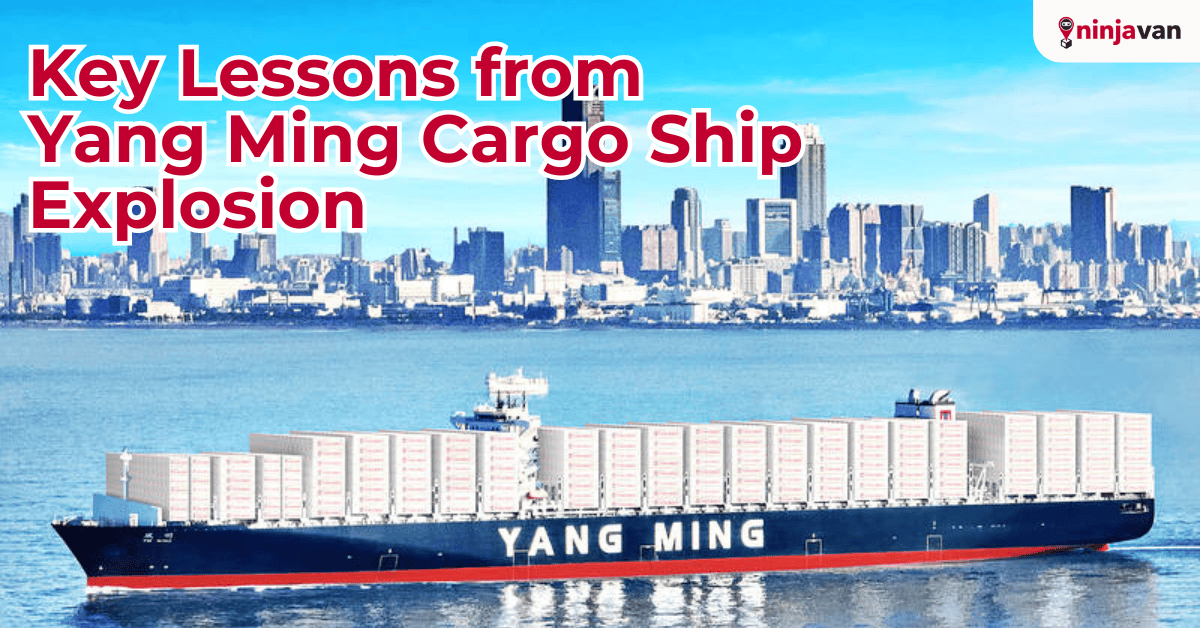The Yang Ming cargo ship explosion was a shocking incident that revealed some critical weaknesses in the shipping and logistics industry. It highlighted how important it is to follow safety protocols when dealing with hazardous materials and ensure containers are properly declared. It also reminds us of the value of being prepared for emergencies and responding quickly to protect everyone involved. Good coordination between shipping companies and authorities can make a big difference in handling these situations effectively. Both businesses that use freight forwarders and the forwarders themselves can learn important lessons from this event to prevent similar accidents and ensure smoother, safer operations.
Summary of the Yang Ming Ship Explosion Incident
On August 9, 2024, Yang Ming Marine Transport Corp, a Taiwanese shipping company, confirmed that one of their cargo ships, the YM Mobility, caught fire while docked at Ningbo-Zhoushan Port in China. The incident happened around 1:40 p.m. local time (0540 GMT).
Chinese state media reported that the explosion caused shockwaves that could be felt up to a kilometer away. Footage from China Central Television (CCTV) showed the explosion occurring among containers near the bow of the ship, sending cargo flying and creating a large plume of black smoke.
The Ningbo Maritime Search and Rescue Centre noted that the ship was carrying hazardous materials, including lithium batteries and tert-Butyl peroxybenzoate. This compound is flammable and explosive, needing to be stored in temperatures below 30°C (86°F) to stay safe.
The cause of the incident is under investigation, but initial findings suggest an explosion occurred in a container loaded with dangerous goods. The container, originally declared as a reefer, was used as a substitute for a dry container without requiring a power connection. Fire control measures were immediately implemented, and the situation is now under control. All crew members have been safely evacuated. Huan Ming (Shanghai) International Shipping Agency Co., Ltd., a subsidiary of Yang Ming Group, is coordinating with authorities to manage the situation. YM Mobility, currently serving the Far East to Middle East route, will have its status, cargo transshipment, and schedule updates provided by Yang Ming as more information becomes available.
Top 3 Lessons for Businesses and Freight Forwarders
1. Strict Adherence to Proper Classification and Handling of Dangerous Goods
The Yang Ming explosion is a clear reminder of how crucial it is to follow safety rules and compliance standards in freight forwarding. To make sure everyone stays safe, businesses and freight forwarders should:
- Follow International Safety Standards: Make sure all shipments stick to the International Maritime Dangerous Goods (IMDG) Code, which offers guidelines on how to safely transport hazardous materials by sea.
- Conduct Regular Safety Audits: Regularly check cargo handling processes, storage facilities, and equipment to spot any potential dangers and areas where improvements are needed.
- Train Employees Properly: All staff involved in shipping operations should undergo mandatory safety training to learn the right way to handle, label, and store hazardous materials.
2. Investment in Technology and Advanced Monitoring Systems
Businesses and freight forwarders should invest in advanced monitoring systems that track the conditions of cargo, including temperature, humidity, and pressure, especially for hazardous materials. Real-time alerts can prevent incidents before they escalate.
Implementing IoT-enabled tracking devices and sensors to monitor the condition of sensitive cargo and ensure that it remains within safe parameters during transit can help freight forwarders make their operations safer and more reliable, preventing incidents like the Yang Ming explosion.
3. Establish Comprehensive Contingency and Risk Management Plans
Being prepared for emergencies is crucial for minimizing damage and ensuring safety. Freight forwarders should:
- Establish Clear Emergency Protocols: Set up clear protocols for different types of emergencies, including evacuation procedures, communication strategies, and coordination with local authorities.
- Conduct Regular Drills: Hold regular drills and training sessions to make sure all employees are familiar with the emergency response plan and know how to act quickly and effectively.
- Adequate Insurance Coverage for high-risk shipments
Final Thoughts
The Yang Ming cargo ship explosion is a wake-up call for the freight forwarding industry, highlighting the need for better safety measures, stricter compliance, and smarter risk management. By learning from this incident and implementing the lessons above, businesses and freight forwarders can make their operations safer and more efficient, protecting their employees and cargo and maintaining their clients’ trust.







